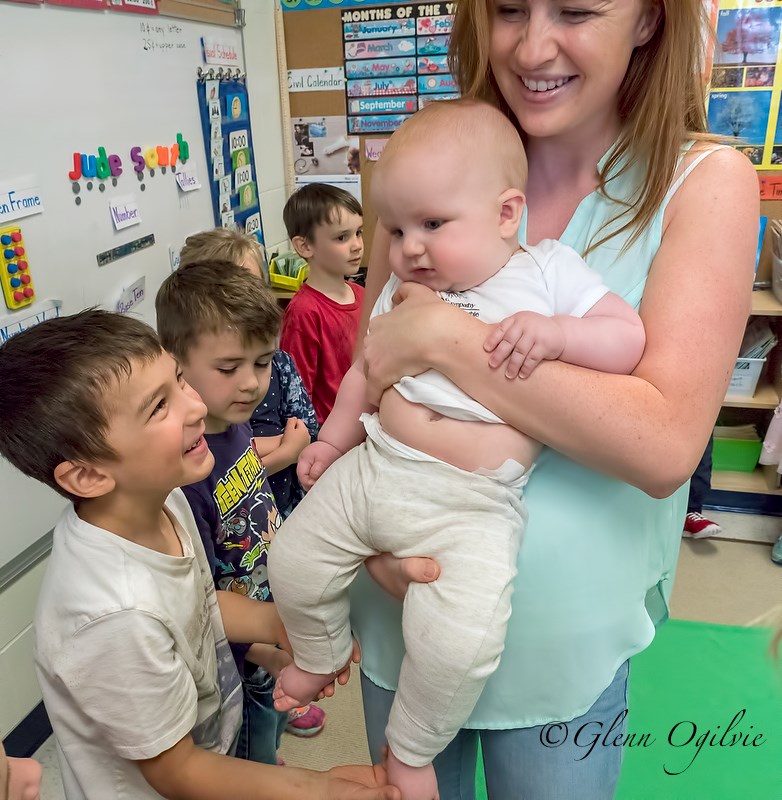Cathy Dobson
Dean Olver is not yet seven months old but he’s already considered one of the best teachers at Sacred Heart School.
With every coo and chuckle, with every little hand reached out to the six-year-olds in Mary Jo Cocarell’s Grade 1 class, baby Dean offers instruction in what some regard as life’s most important lesson.
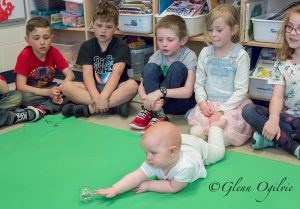
It’s called emotional literacy, says Sacred Heart principal Bill Nelson. And it goes a long way to stop bullying and create empathy toward others.
The program is called Roots of Empathy and its lessons stay with students for life, says Cocarell.
“By bringing a mother and her baby into the classroom, I see the students learn to be more patient with one another. They approach problems differently and think about what it’s like to be in the other person’s shoes.”
Ten years ago, she and Nelson were turned onto the program through a book by Roots of Empathy creator and Toronto educator Mary Gordon.
In “Roots of Empathy: Changing the World Child by Child,” Gordon writes about fostering attachment, authentic communication and social inclusion.
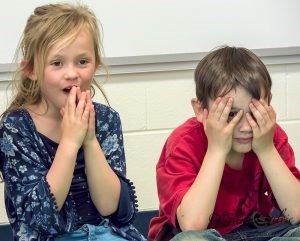
She cites story after story about schoolyard bullies transformed into supportive classmates.
In 2008, Cocarell and Nelson were working at St. Joseph School in Corunna, where they introduced Roots of Empathy to Lambton and Kent counties.
Kim Jackson, a Lambton College employee, was the first instructor to receive Roots of Empathy training and is now a mentor and key point person locally.
“It does make a difference. I’ve seen it,” said Jackson. “It works because children get to see the whole dance between baby and parent.
“They see that emotions can be recognized even if there are no words exchanged. They begin to notice queues like facial expressions and body language and learn to tune into relationships.”
This school year, 50 babies and their moms are visiting 50 different classrooms each month in Sarnia-Lambton and Chatham-Kent in both the Catholic and public school systems.
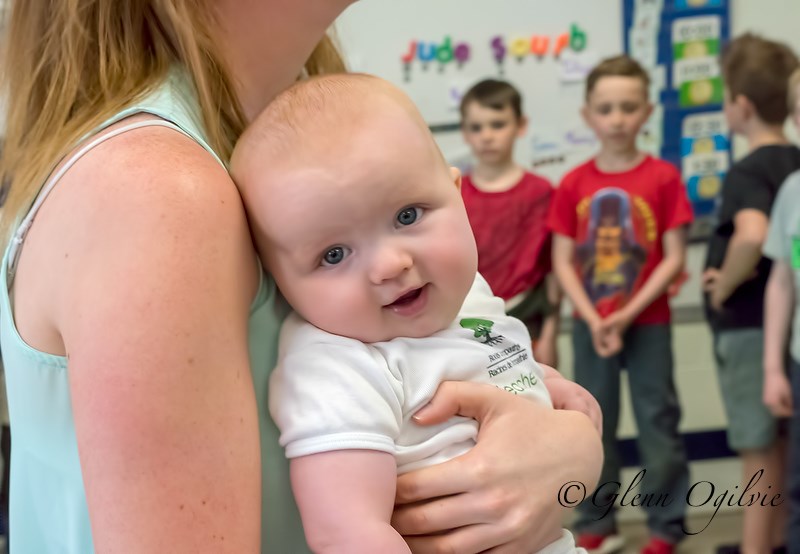
About 90% of the program is delivered at the Kindergarten and Grade 1 level. A few older grades also participate with slightly different program material.
“I think it’s just genius,” says Mary Ann Hucker, the Roots of Empathy facilitator in Cocarell’s class.
“Mary Gordon realized that, although you are born with empathy, if you don’t feel it or see it, you lose it,” said Hucker. “You become less sensitized.”
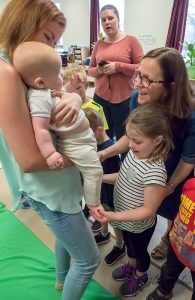
Once a month, the children in Cocarell’s Grade 1 class spend 30 minutes with baby Dean and his mom Sian Olver. Hucker facilitates, sticking exactly with Gordon’s lesson plans.
The children form a circle and greet Dean, who is a smiley, social baby. He shows the kids how he loves to play with his mom, chatter with her and respond to her voice.
Each child has witnessed the connection between mother and child since first meeting Dean when he was a few weeks old.
“The students learn to understand the baby’s feelings and those of the mother,” said principal Nelson.
“The hope is that when they see the mother-child connection, and see it grow, they think about their own feelings and how others feel.
“I see it working in the classrooms and on the schoolyard,” Nelson said. “There’s a strong anti-bullying message. I ask an aggressive student if they would act like that with the baby. They say no, and I ask, “Then why would you act like that with your friends?”’
Roots of Empathy in Sarnia-Lambton and Chatham-Kent has a steady stream of new babies and moms asking to be a part of the program.
“Parents want it. Teachers ask for it, and the students love it,” Hucker said.
Volunteers require four days of Roots of Empathy training, offered free-of-charge in Sarnia. They are also provided with the toys, manuals and storybooks required. A two-year commitment is necessary.
Anyone interested can contact kim.jackson@lambton college.ca.
